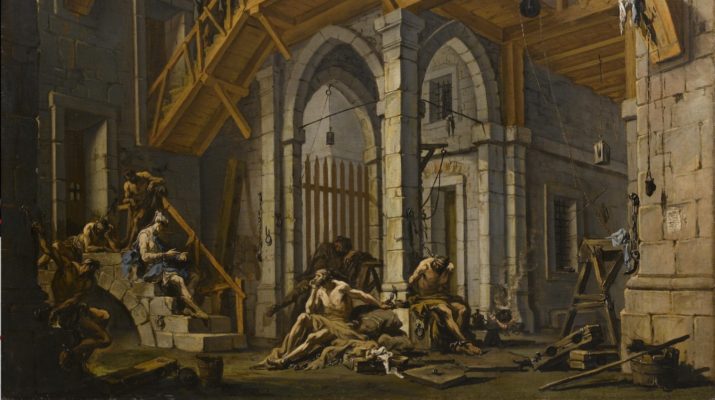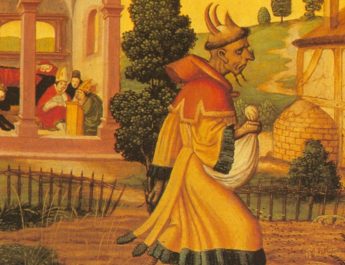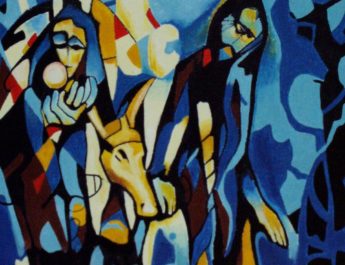Genesis 40
BibleHub
1 ASome time after this,B the cupbearerC of the king of EgyptD
Notes on verse 1a
A {untranslated} = hayah. This is to be or become, to happen.
B {untranslated} = dabar. From dabar (to speak, declare, discuss). This is speech, a word, a matter, an affair, charge, command, message, promise, purpose, report, request. It is a word, which implies things that are spoken of in a wide sense.
C “cupbearer” = mashqeh. 19x in OT. From shaqah (to give water to, to cause to drink – to irrigate, drown; watering plants or giving water to flocks). This is drinking, a drink, cupbearer, or a place that is well irrigated.
D “Egypt” = Mitsrayim. Perhaps from matsor (besieged or fortified place, bulwark, entrenchment; something hemmed in; a siege or distress or fastness); from tsur (to confine, besiege, to cramp). This is Egypt.
and his bakerE offendedF their lordG the king of Egypt.
Notes on verse 1b
E “baker” = aphah. This is one who cooks or bakes – particularly one who cooks meat.
F “offended” = chata. This is properly to miss, and so figuratively it is used for sinning, bearing the blame. It implies a forfeiture or loss of something.
G “lord” = adon. From a root that means ruling or being sovereign. This is lord, master, or owner.
2 PharaohH was angryI with his two officers,J the chiefK cupbearer and the chief baker,
Notes on verse 2
H “Pharaoh” = Paroh. From Egyptian pr (palace, pharaoh; literally house + great). This is Pharaoh, a title for Egyptian kings. Seehttps://en.wiktionary.org/wiki/pharaoh
I “was angry” = qatsaph. This is angry or provoked to wrath. It suggests a bursting into anger.
J “officers” = saris. Root is likely foreign and may mean castrate. So, this could be a eunuch, valet, or other kind of officer.
K “chief” = sar. This is chief, leader, ruler, lord, official, governor, prince, military leader. It refers to someone at the top of a rank or class.
3 and he putL them in custodyM in the houseN of the captainO of the guard,P
Notes on verse 3a
L “put” = natan. This is to give, put, set, offer. It is to give literally or figuratively.
M “custody” = mishmar. From shamar (to keep, watch, or preserve; to guard something or to protect it as a thorny hedge protects something). This is jail, guard, watch, guard post.
N “house” = bayit. Probably from banah (to build, make, set up, obtain children; to build literally or figuratively). This is house, court, family, palace, temple.
O “captain” = sar. Same as “chief” in v2. See note K above.
P “guard” = tabbach. From tabach (to slaughter or butcher; of animals or people). This is cook or guardsman.
in the prisonQ, R where JosephS was confined.T
Notes on verse 3b
Q “prison” = bayit + sohar. Literally “house of imprisonment.” Bayit is the same as “house” in v4. See note N above. Sohar is 8x in OT. From the same as sahar (roundness). This is jail, dungeon, or one who keeps the jail.
R {untranslated} = maqom. From qum(to arise, stand, accomplish, establish, abide; rising against, getting up after being sick or asleep, arising from one state to another, becoming powerful, or rising for action; standing in a figurative sense). This is a standing, which is to say a spot or space a place. It can also refer to a locality or a physical/mental condition. HaMaqom is also a Jewish name for God – the place, i.e. the Omnipresent One.
S “Joseph” = Yoseph. From yasaph (to add, increase, continue, exceed). This is Joseph, meaning “he increases” or “let him add.”
T “confined” = asar. This is to tie, yoke, bind, or fasten. It can mean to harness an animal, to join in fighting a battle, or to imprison someone.
4 The captain of the guard chargedU Joseph with them, and he waitedV on them; and they continuedW for some timeX in custody.
Notes on verse 4
U “charged” = paqad. This is to attend to or visit – can be used for a friendly or violent encounter. So, it can be to oversee, care for, avenge, or charge.
V “waited on” = sharath. This is ministering, serving, or waiting on. It can refer to one offering service as a worshipper or one serving as a servant.
W “continued” = hayah. Same as {untranslated} in v1. See note A above.
X “time” = yom. Root may mean being hot. This is the day in a literal or figurative sense. It can also mean birth, age, daylight, continually or other references to time.
5 OneY nightZ they bothAA dreamedBB—the cupbearer and the baker of the king of Egypt, who were confined in the prison—
Notes on verse 5a
Y “one” = echad. Perhaps from achad (to unify, continue on a path; figuratively, to gather one’s thoughts). This is the number one, first, united. It can also be alone, altogether, a certain, a few.
Z “night” = layil. Properly, this refers to light twisting away. It is used for night or midnight. Figuratively, this can mean adversity.
AA “both” = shenayim. From sheni (double, again, another, second); from shanah (to fold, repeat, double, alter, or disguise). This is two, both, second, couple.
BB “dreamed” = chalam + chalom. Literally “dreamed a dream.” Chalam is properly, to bind solidly and so to be plump. This is to be healthy or strong, to recover; figuratively, to dream. Chalom is related to “dreamed” in v5. From chalam (see above). This is a dream or dreamer.
eachCC his ownDD dream, and each dream with its own meaning.EE
Notes on verse 5b
CC “each” = enosh. From anash (to be weak, sick, or frail). This is human, humankind, another. It is mortal.
DD “own” = enosh. Same as “each” in v5. See note CC above.
EE “meaning” = pithron. 5x in OT. From pathar (to open, interpret). This is an interpretation.
6 When Joseph cameFF to them in the morning,GG he sawHH thatII they were troubled.JJ
Notes on verse 6
FF “came” = bo. This is to enter, come in, advance, fulfill, bring offerings, enter to worship, attack. It can also have a sexual connotation.
GG “morning” = boqer. From baqar (to seek, plow, break forth, admire, care for). This refers to the break of day. So it is dawn, early, morning, or morrow.
HH “saw” = raah. This is to see in a literal or figurative sense so stare, advise, think, view.
II {untranslated} = hen. This is a remark of surprise or excitement: lo! Behold! It can also mean if or though.
JJ “troubled” = zaaph. 5x in OT. This mean to boil – figuratively to be enraged, sad, worried, or dejected.
7 So he askedKK Pharaoh’s officers, who were with him in custody in his master’s house, “Why are your facesLL downcastMM today?”NN
Notes on verse 7
KK “asked” = shaal. This is to ask, inquire, beg, borrow, desire, request. It can also mean to demand.
LL “faces” = paneh. From panah (to turn, face, appear). This is face in a literal or figurative sense. It could be face, presence, anger, respect. It can also be used of God to indicate divine favor or presence.
MM “downcast” = ra’. From ra’a’ (to be evil, bad, afflict; properly, to spoil – to destroy by breaking into pieces; figuratively, to cause something to be worthless; this is bad in a physical, social, or moral sense; that which displeases, to do harm or mischief, to punish or vex). This is bad, disagreeable, that which causes pain, misery, something having little or no value, something that is ethically bad, wicked, injury, calamity. This refers to anything that is not what it ought to be – a natural disaster, a disfigurement, an injury, a sin.
NN “today” = yom. Same as “time” in v4. See note X above.
8 They said to him, “We have had dreams, and there is no one to interpretOO them.”
And Joseph said to them, “Do not interpretations belong to God?PP PleaseQQ tellRR them to me.”
Notes on verse 8
OO “interpret” = pathar. Related to “meaning” in v5. See note EE above.
PP “God” = Elohim.
QQ “please” = na. This particle is used for requests or for urging. It can be we pray, now, I ask you, oh. This is the same “na” in “hosanna.”
RR “tell” = saphar. From sepher (writing, document, book, evidence). This is properly to tally or record something. It can be enumerate, recount, number, celebrate, or declare.
9 So the chief cupbearer told his dream to Joseph, and said to him, “SSIn my dream there was a vineTT beforeUU me, 10 and on the vine there were threeVV branches.WW
Notes on verses 9-10a
SS {untranslated} = hinneh. Related to {untranslated} in v6. From hen (see note II above). This is to draw attention, show suddenness or surprise, or to emphasize the importance of the coming statement. See! Lo! Behold!
TT “vine” = gephen. Root may mean to twine or bend. So, it is a vine, particularly referring to grapes.
UU “before” = paneh. Literally “before my face.” Same as “faces” in v7. See note LL above.
VV “three” = shalosh. This is three, fork, three times.
WW “branches” = sarig. 3x in OT. From sarag (to twine together, wrap). This is twig or branch.
As soon as it budded,XX its blossomsYY came outZZ and the clustersAAA ripenedBBB into grapes.CCC
Notes on verse 10b
XX “budded” = parach. This is to sprout, blossom, bloom, spread, flourish.
YY “blossoms” = nets. 4x in OT. From natsats (to sparkle, have a bright color). This is a blossom or flower. It could also refer to a hawk, which seems to gleam with its great speed.
ZZ “came out” = alah. This is to go up, approach, ascend, be high, be a priority; to arise in a literal or figurative sense.
AAA “clusters” = eshkol. 9x in OT. Perhaps from eshek (a gathered bunch; can be a testicle or stone). This is cluster – as a bunch of fruit like grapes.
BBB “ripened” = bashal. This is to boil up, roast, or bake. It can also mean ripen, produce, or seethe.
CCC “grapes” = enab. 19x in OT. Root may mean to bear fruit. This is a grape, raisin, or wine. It can be used for the literal crop or as a metaphor for God’s relationship with Israel.
11 Pharaoh’s cupDDD was in my hand;EEE and I tookFFF the grapes and pressed them into Pharaoh’s cup, and placedGGG the cup in Pharaoh’s hand.”HHH
Notes on verse 11
DDD “cup” = kos. This refers to a cup or an owl.
EEE “hand” = yad. This is hand, ability, power. Hand in a literal sense, but also what one can do or the means by which one does it.
FFF “took” = laqach. This is to take, accept, carry away, receive. It can also have the sense of take a wife or take in marriage.
GGG “placed” = natan. Same as “put” in v3. See note L above.
HHH “hand” = kaph. From kaphaph (to bend – from a root meaning curve or bend down). This is palm of the hand or sole of the foot, footstep, grasp. Figuratively, it can also mean power.
12 Then Joseph said to him, “This is its interpretation: the three branches are three days; 13 within three days Pharaoh will lift upIII your headJJJ and restoreKKK you to your office;LLL
Notes on verses 12-13a
III “lift up” = nasa. This is to lift in a broad sense, literally and figuratively. So it could be to carry, take, or arise. It could also be bring forth, advance, accept.
JJJ “head” = rosh. This may come a word that means to shake. It is the head, captain, or chief. It can also be excellent or the forefront. It can be first in position or in statue or in time (i.e. the beginning).
KKK “restore” = shub. To turn back, return, turn away – literally or figuratively. Doesn’t necessarily imply going back to where you started from. This is also the root verb for the Hebrew word for repentance “teshubah.”
LLL “office” = ken. 16x in OT. From the same as ken (to set upright; generally used figuratively for thus, so, afterwards, rightly so); perhaps from kun (properly, in a perpendicular position; literally, to establish, fix, fasten, prepare; figuratively, it is certainty, to be firm, faithfulness, render sure or prosperous). This is a stand, place, right, honest, office.
and you shall place Pharaoh’s cup in his hand,MMM just asNNN you used toOOO do when you werePPP his cupbearer.
Notes on verse 13b
MMM “hand” = yad. Same as “hand” in v11. See note EEE above.
NNN “just as” = mishpat. From shaphat (to judge, defend, pronounce judgment, condemn, govern). This is a verdict or formal sentence whether from humans or from God. It includes the act of judging as well as the place that judging takes place, the suit itself, and the penalty. Abstractly, this is justice, which includes the rights of the participants.
OOO “used to” = rishon. Related to “head” in v13. From rishah (beginning or early time); from rosh (see note JJJ above). This is first, former, ancestor, beginning, ranked first.
PPP “were” = hayah. Same as {untranslated} in v1. See note A above.
14 But rememberQQQ me when it is wellRRR with you; please doSSS me the kindnessTTT
Notes on verse 14a
QQQ “remember” = zakar. This is to remember, to mark something so that it can be recalled, to be mindful of, to mention.
RRR “is well” = yatab. This is to be good or pleasing, joyful. It can also mean doing good in an ethical sense or be beautiful, happy, successful, or right.
SSS “do” = asah. This is to make, do, act, appoint, become in many senses.
TTT “kindness” = chesed. From chasad (being good, kind, merciful; may mean bowing one’s neck as is done in the presence of an equal for courtesy’s sake; so, if one in a superior position is treating you like an equal, that is what is captured here). This is favor, goodness, kindness, loving kindness, pity, reproach, or a good deed. When done by God to humanity, this is mercy/loving kindness. When done by humanity to God, it is piety.
to make mentionUUU of me to Pharaoh, and so get me outVVV of this place.WWW
Notes on verse 14b
UUU “make mention” = zakar. Same as “remember” in v14. See note QQQ above.
VVV “get…out” = yatsa. This is to go or come out, bring forth, appear. It is to go out in a literal or figurative sense.
WWW “place” = bayit. Same as “house” in v4. See note N above.
15 For in fact I was stolenXXX out of the landYYY of the Hebrews;ZZZ
Notes on verse 15a
XXX “in fact…stolen” = ganab + ganab. This is to steal in a stealthy way rather than through violence. It can also mean to deceive. There is a Yiddish word ganef that derives from this root. It means thief or scoundrel. The word is repeated twice – the second time as an Infinitive Absolute. The Infinitive Absolute serves to emphasize the sentiment of the word. It is rather like Foghorn Leghorn’s speech pattern, “I said, I said.”
YYY “land” = erets. Root may mean to be firm. This is earth, ground, field land, or country.
ZZZ “Hebrews” = Ibri. From Eber (the region beyond; Eber, the name of several Israelites including a descendant of Shem); from abar (to pass over, pass through, or pass by; cross over or to alienate; used for transitions). This is Hebrew, perhaps meaning a descendant of Eber.
and here also I have done nothingAAAA that they should have putBBBB me into the dungeon.”CCCC
Notes on verse 15b
AAAA “nothing” = meumah. From the same as mum (defect – an ethical one or a literal bodily one). Its root may mean to stain. This can mean a speck or fault. More broadly, it can also refer to anything or nothing.
BBBB “put” = sim. This is to put or place in a literal or figurative sense. It can be appoint, care, change, make, and may other things.
CCCC “dungeon” = bor. From bur (to bore; figuratively, to explain, examine, or clear up). This is a pit – generally a cistern or dungeon. It could also be a well or fountain.
16 When the chief baker saw that the interpretation was favorable,DDDD he said to Joseph, “I also had a dream:EEEE there were three cakeFFFF basketsGGGG on my head,
Notes on verse 16
DDDD “favorable” = tob. From tob (to be pleasing, to be good). This is good, beautiful, pleasant, agreeable, bountiful, at ease. This word is used for goodness as a concept, a good thing, a good person. This can refer to prosperity and welfare as well as joy, kindness, sweetness, and graciousness. So, this is ethically good, but also enjoyably good.
EEEE {untranslated} = hinneh. Same as {untranslated} in v9. See note SS above.
FFFF “cake” = chori. 1x in OT. From chavar (to be or become white or pale). This is cake or white bread.
GGGG “baskets” = sal. 15x in OT. Perhaps from salal (to lift up, build, pile, extol, exalt; can also be used for opposing as a dam holds back water). This is a woven basket.
17 and in the uppermost basket there were all sortsHHHH of baked foodIIII for Pharaoh, but the birdsJJJJ were eatingKKKK it out of the basket on my head.”
Notes on verse 17
HHHH “sorts” = maakal. From akal (to eat, devour, burn up, or otherwise consume; eating in a literal or figurative sense). This is food, something edible.
IIII “food” = maaseh. Related to “do” in v14. From asah (see note SSS above). This is a word – any action whether positive or negative. It can also be a transaction, construction, activity, property, or something that is produced.
JJJJ “birds” = oph. From uph (to fly, flee, shine, be weary, be faint). This is a flying creature.
KKKK “eating” = akal. Related to “sorts” in v17. See note HHHH above.
18 And Joseph answered,LLLL “This is its interpretation: the three baskets are three days; 19 within three days Pharaoh will lift up your head—from you!—and hangMMMM you on a pole;NNNN and the birds will eat the fleshOOOO from you.”
Notes on verses 18-19
LLLL “answered” = anah. This is answer, respond, announce, sing, shout, or testify. It means to pay attention, which implies responding and, by extension, starting to talk. Used in a specific sense for singing, shouting, testifying, etc.
MMMM “hang” = talah. This is to hang or suspend. It can also be used for hanging someone on gallows.
NNNN “pole” = ets. Perhaps from atsah (to shut, fasten, firm up, to close one’s eyes). This is tree or other things related to trees like wood, sticks, or stalks. It can also refer to wood products like a plank or staff or gallows. Additionally, this can refer to a carpenter.
OOOO “flesh” = basar. From basar (being a messenger, publish, carry preach; properly, this is being fresh, rosy or cheerful as one bearing news). This is flesh, the body, fat, skin, self, nakedness, humankind, or kin. It can also refer to private parts.
20 On the thirdPPPP day, which was Pharaoh’s birthday,QQQQ he madeRRRR a feastSSSS for all his servants,TTTT
Notes on verse 20a
PPPP “third” = shelishi. Related to “three” in v10. From the same as shalosh (see note VV above). This is third or one-third.
QQQQ “birthday” = yom + yalad. Yom is the same as “time” in v4. See note X above. Yalad is to bear or bring forth. It can mean to act as midwife or to show one’s lineage. This is often used for birth or begetting.
RRRR “made” = asah. Same as “do” in v14. See note SSS above.
SSSS “feast” = mishteh. From shathah (to drink literally or figuratively; a drinker). This is drink or the act of drinking. So it is a feast or banquet, as occasions with drinking.
TTTT “servants” = ebed. From abad (to work, serve, compel; any kind of work; used causatively, can mean to enslave or keep in bondage). This is a servant, slave, or bondservant.
and lifted up the head of the chief cupbearer and the head of the chief baker amongUUUU his servants. 21 He restored the chief cupbearer to his cupbearing, and he placed the cup in Pharaoh’s hand;VVVV 22 but the chief baker he hanged, just as Joseph had interpreted to them. 23 Yet the chief cupbearer did not remember Joseph, but forgotWWWW him.
Notes on verses 20b-23
UUUU “among” = tavek. This is among, middle, in the midst, the center. Perhaps, properly, to sever.
VVVV “hand” = kaph. Same as “hand” in v11. See note HHH above.
WWWW “forgot” = shakach. This is to forget or mislay – it is not knowing because of forgetfulness or inattentiveness.
Image credit: “Joseph Interpreting Dreams” by Alessandro Magnasco, 1700s.




